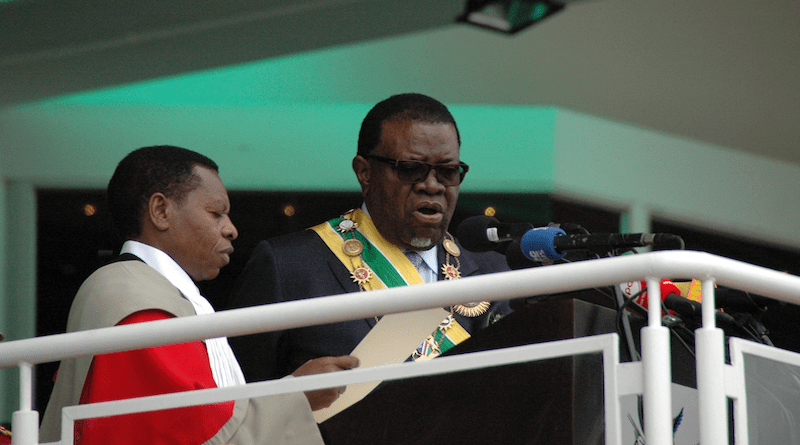Namibian Leader In Bitter Feud Over Colonialism With SWAPO Critics – OpEd
By IDN
By Lisa Vives
At a recent meeting of the SWAPO Party Youth League in Ongwediva, Namibian President Hage Geingob took the offensive, attacking his critics for dismissing the successes of the SWAPO party.
“SWAPO is not dying, and party members should tell those who think so to go to hell,” he said forcefully. Those leaving its ranks because they think it is dead would not be missed, he added.
“SWAPO dying? Where?” he said, addressing the youth league. “When I looked at you, when I came in, how you behaved, that is SWAPO dying? Is SWAPO dead? You are dying? Tell them to go to hell.”
He added that the party would not miss counter-revolutionaries, racists and tribalists. “There are those who are now ashamed to be associated to SWAPO.”
Geingob also took a jab at opposition parties.
“They cannot even run a municipality. They are expelling each other left and right. I was talking to my colleagues, “let them lead; you will see in six months. Which other political party can bring this big number of people together overnight?”
Critics of President Geingob fault him for blaming the country’s underdevelopment on colonialism.
“It points to a head of state running out of ideas on how to fix a mess created by the political elite over the past 21 years,” The Namibian charged in a recent editorial.
“The President has a point about the devastating effects of colonialism,” the editors agreed. However, the problem is fixable, they argued, although corruption is a harder nut to crack.
Corruption “has not only impeded development but has had a debilitating effect on the national psyche,” they maintained.
Some 25 years ago, The Namibian published an article titled ‘Corruption Set to Derail Economic Activities’. Published a mere seven years after independence—on August 22, 1997—it reported on a meeting held that month to discuss possible ways to fix Namibia.
“We need to re-examine what we have failed to do to promote development, and dialogue is therefore of vital importance if we are to come up with winning solutions for Namibia,” said founding president Sam Nujoma who recently recovered from COVID.
Meanwhile, President Geingob denounced his critics for dismissing colonialism for its destructive impacts. “It was a hundred years of oppression. Yet there is an expectation that we must solve problems in 30 years,” he said.
This gave his critics another opportunity to attack him.
In a column titled “End the Greed, Mr President”, the editorial board wrote: “Frankly, Geingob has been part of the problem. He served as Namibia’s prime minister for close to 15 years and has been president for more than seven years”.
“Yet the president keeps bringing up colonialism to defend SWAPO’s poor governance and why things continue to fall apart.
“Is colonialism also to blame for the government’s massive wage bill, which is expected to total around N$30,1 billion—half of the budgeted revenue of N$59,7 billion?
“Like his predecessors, Geingob has increased the parliament despite warnings about the need to trim the civil service. In addition, he has chosen to introduce an unnecessary vice-presidential position and has continued the chain of patronage.
“Is colonialism to blame for the vanity construction projects such as the petroleum storage facility, ministerial head offices and projects like the Neckartal Dam, which together cost close to US$1.3 billion?
“Two weeks ago, The Namibian reported on the N$80 million retirement package for former presidents.
These are but a few examples that illustrate how blaming colonialism has become the fallback position of the powers that be. Not only does it not change anything, but it is also the wrong approach.”
The President was also scored for attacking the homeless and under-housed. “You just come and settle in an area where no water, no toilet facilities were planned for, and you go and say ‘we are suffering’,” Geingob said in an address to church leaders at State House.
“The public expectation is that the government should fulfil its housing promises, including removing unnecessary bureaucracies to sustainably build more houses,” editors said.
“Geingob’s administration has been sitting on close to 1,000 houses built under a mass housing program under former president Hifkepunye Pohamba. Three years ago, Geingob said the widespread shacks across the country offended him. “He wanted them gone in five years. The clock is now ticking on whether Geingob will achieve that.
“Or should the failure to deliver be blamed on colonialism too?”
SWAPO, which traces its history back to the anti-colonial and anti-apartheid struggle, has won every election ever since the country gained independence in 1990. In its 24-year rule, SWAPO has garnered support by focusing on better infrastructure and primary education and investing in railways.
As the mineral-rich country’s new president, Geingob must tackle ethnic strife in a country of 2.3 million people who are unhappy about land distribution and housing problems, especially in the capital, Windhoek. Geingob has promised to build 185,000 new homes in the next 18 years.
Meanwhile, the World Health Organization reports 166,645 confirmed cases of COVID-19 in Namibia, with 4,077 deaths, as of September 2022. As of September 2022, a total of 947,273 vaccine doses have been administered. The population of Namibia stands at 2.541 million.

